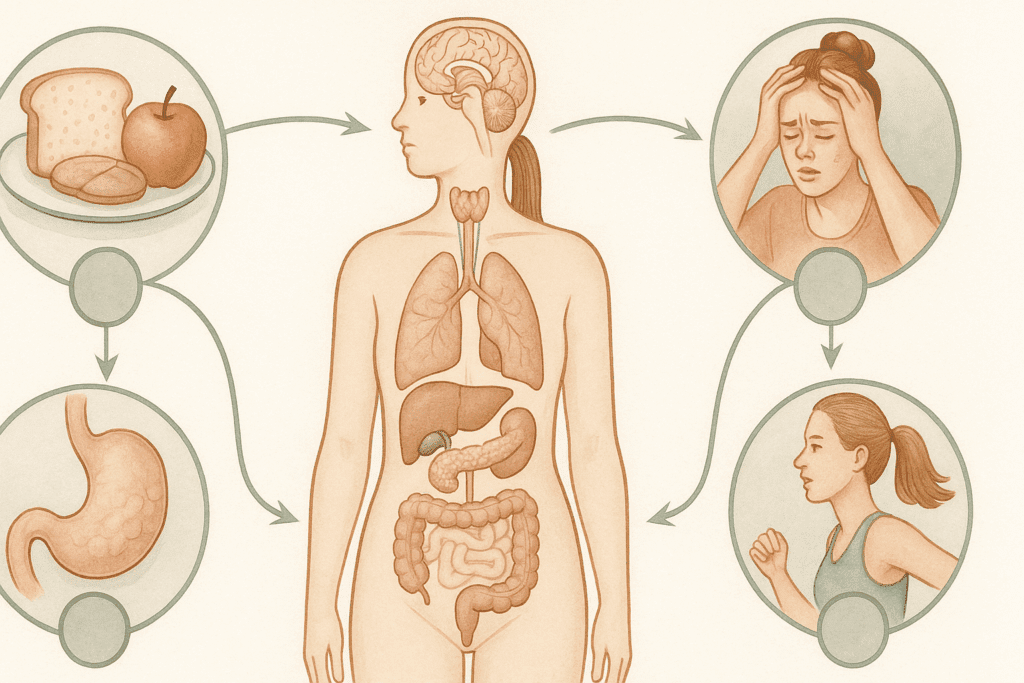In an era increasingly defined by wellness trends and the pursuit of sustainable health practices, natural weight loss remedies have captured the attention of both researchers and health-conscious individuals alike. As concerns about the long-term effects of synthetic diet pills, extreme calorie restriction, and invasive weight loss surgeries continue to rise, people are turning toward holistic, evidence-based approaches that align with the body’s natural physiology. These alternatives are not only considered safer but often come with a variety of additional health benefits, including improved digestion, metabolic regulation, and reduced inflammation.
You may also like: Expert-Backed Weight Loss Tips for a Healthier Lifestyle: What You Need to Know for Long-Term Weight Control and Wellness
The science behind natural weight loss is rooted in an understanding of how certain foods, herbs, and home practices interact with key metabolic pathways. Rather than triggering rapid and unsustainable weight reduction, natural methods aim to support the body’s innate ability to achieve balance through nutrient-dense diets, hormonal regulation, and enhanced thermogenesis. In this article, we explore the best doctor-recommended natural weight loss remedies, including foods and herbs backed by clinical studies, along with practical home solutions that empower individuals to take control of their weight safely and sustainably.

Harnessing the Power of Natural Weight Loss Foods and Herbs
The growing interest in natural weight loss foods and herbs is not a passing fad. Numerous studies have demonstrated the potential of certain plants and food-based compounds to promote fat metabolism, suppress appetite, and reduce oxidative stress—all without the risks associated with pharmaceutical interventions. For example, green tea, particularly in its concentrated form, has been shown to aid weight loss by enhancing fat oxidation and increasing thermogenesis. This is largely attributed to catechins like EGCG, which have been extensively studied for their metabolic effects.
Similarly, foods rich in soluble fiber, such as oats, chia seeds, and legumes, help prolong satiety by slowing digestion and reducing spikes in blood glucose. Fiber’s impact on gut microbiota also plays a critical role in weight regulation. Emerging research suggests that individuals with a more diverse gut flora tend to have lower body fat percentages, and fiber serves as a primary fuel source for these beneficial microbes. In the case of herbs, fenugreek and ginger stand out. Fenugreek contains galactomannan, a water-soluble fiber that promotes fullness, while ginger exerts thermogenic and anti-inflammatory properties that contribute to enhanced energy expenditure.
Natural weight loss remedies are not confined to exotic superfoods or rare botanicals. Often, they involve accessible ingredients like lemon, apple cider vinegar, turmeric, and cinnamon—all of which offer both culinary versatility and metabolic advantages. These everyday items can be incorporated into meals or consumed as part of health-promoting drinks, such as herbal teas and infused waters, to support gradual, sustainable fat loss.

Home Remedies for Weight Loss: Science Meets Simplicity
Among the most appealing aspects of home remedies for weight loss is their simplicity. Many effective approaches can be integrated into daily routines with minimal effort and expense. Hydration, for example, is a fundamental yet often overlooked component of weight management. Drinking a glass of water before meals has been clinically shown to reduce caloric intake, while proper hydration supports efficient fat metabolism, kidney function, and appetite regulation.
Intermittent fasting is another home-based strategy that has gained significant traction, not only among the wellness community but also within scientific literature. Unlike restrictive diets that require complex planning or expensive meal replacements, intermittent fasting involves timing meals to promote metabolic flexibility. Approaches like the 16:8 method—which entails fasting for 16 hours and eating within an eight-hour window—have been associated with reduced insulin resistance, decreased body fat, and improved energy balance.
Sleep hygiene and stress management are frequently underemphasized but are crucial components of effective natural weight loss remedies. Cortisol, the primary stress hormone, can interfere with fat loss by promoting visceral fat accumulation and increasing cravings for sugary foods. Creating a consistent sleep schedule, limiting blue light exposure before bed, and practicing mindfulness or gentle yoga can support hormonal balance and improve weight-related outcomes over time. These practices serve as an easy weight loss alternative that nurtures the body rather than punishing it.

The Role of Hormones in Natural Weight Management
Understanding the hormonal basis of weight gain and loss provides a critical foundation for appreciating why natural remedies can be so effective. Insulin, ghrelin, leptin, and cortisol are among the key hormones that regulate appetite, energy expenditure, and fat storage. Natural weight loss foods and herbs often work by influencing these hormones in subtle but meaningful ways. For example, high-protein foods like legumes and quinoa increase levels of peptide YY, a hormone that promotes satiety. Meanwhile, foods with a low glycemic index help stabilize insulin levels, reducing the likelihood of fat storage.
Adaptogenic herbs such as ashwagandha, rhodiola, and holy basil have also gained attention for their impact on cortisol and stress-related eating. By modulating the hypothalamic-pituitary-adrenal (HPA) axis, these herbs can help restore a sense of balance and reduce the urge for emotional eating. In combination with mindful eating practices—such as paying attention to hunger cues and avoiding distractions during meals—these natural interventions can foster a healthier relationship with food.
Home remedies for weight loss that support hormonal regulation include consistent meal timing, exposure to natural sunlight, and reducing consumption of highly processed foods. Each of these practices supports the endocrine system in ways that amplify the effects of dietary changes and herbal supplementation. As such, hormonal health should be considered an essential component of any comprehensive natural weight loss strategy.

An Evidence-Based Approach to Herbal Remedies
Among the most rigorously studied herbal weight loss remedies is Garcinia cambogia, a tropical fruit whose rind contains hydroxycitric acid (HCA). While early studies indicated modest benefits in appetite suppression and fat loss, more recent meta-analyses suggest that results may vary based on dosage, formulation, and individual metabolic differences. Nonetheless, its popularity underscores the public’s interest in natural solutions that offer a pharmacological alternative.
Similarly, berberine, an alkaloid found in plants like barberry and goldenseal, has demonstrated considerable promise for managing weight and metabolic health. Berberine activates AMP-activated protein kinase (AMPK), a master regulator of cellular energy. This action enhances glucose uptake and fatty acid oxidation, making berberine a compelling choice for those seeking natural weight loss remedies with a scientific foundation.
Another powerful yet often underappreciated herb is dandelion. Traditionally used as a digestive tonic and diuretic, dandelion contains compounds that support liver detoxification and reduce water retention. While not a fat-loss agent per se, its ability to reduce bloating and promote elimination can contribute to a sense of lightness and well-being, especially when paired with other weight loss remedies.

Integrating Easy Weight Loss Alternatives into Daily Life
What makes an easy weight loss alternative truly sustainable is its ability to fit seamlessly into an individual’s lifestyle. Rather than promoting dramatic dietary overhauls, the most effective strategies build upon existing habits and gradually shift behaviors toward healthier patterns. Swapping sugary snacks for fresh fruit with cinnamon, drinking green tea instead of soda, or walking for 20 minutes after dinner are all examples of incremental changes that, when maintained over time, lead to measurable results.
Meal prepping with natural weight loss foods and herbs can also remove the guesswork from healthy eating. Preparing meals that include high-fiber vegetables, plant-based proteins, and thermogenic spices like cayenne or turmeric creates a supportive environment for weight regulation. Equally important is cultivating an awareness of portion sizes and the body’s natural hunger and satiety signals, which are often disrupted by habitual overeating or emotional triggers.
Social and environmental factors also play a role in shaping weight loss outcomes. Individuals who feel supported by their peers, whether through accountability partners or online communities, are more likely to stick with new behaviors. Moreover, creating a home environment that prioritizes natural whole foods—by organizing the kitchen, limiting processed food visibility, and making fruits and vegetables easily accessible—can reinforce the adoption of easy weight loss alternatives in meaningful ways.

Evaluating the Safety and Effectiveness of Natural Remedies
Despite their appeal, not all weight loss remedies are created equal. It is essential to approach natural solutions with the same critical eye that would be applied to conventional treatments. Scientific validation, appropriate dosage, and understanding contraindications—particularly for individuals with chronic conditions or those taking medications—are all part of responsible use. For instance, while green tea extract is generally safe, high doses can lead to liver toxicity in rare cases, especially when consumed as a supplement rather than a beverage.
The importance of consulting with a healthcare provider before starting any new herbal remedy or drastic dietary shift cannot be overstated. Functional medicine practitioners, registered dietitians, and naturopathic doctors can help tailor interventions to individual needs, ensuring that the selected natural weight loss remedies complement existing health conditions and goals.
That said, most home remedies for weight loss carry minimal risk and offer a favorable safety profile when used appropriately. Their effectiveness, while often modest compared to pharmaceutical solutions, tends to build over time and contributes to overall health rather than focusing narrowly on weight reduction. This broader perspective aligns with emerging views in the medical community, which increasingly emphasize metabolic health, inflammation reduction, and quality of life over simple scale-based metrics.
Redefining Success in Natural Weight Loss Journeys
Perhaps one of the most compelling aspects of embracing natural weight loss foods and herbs is the shift in mindset they encourage. Rather than chasing short-term weight loss at any cost, individuals are invited to engage in a deeper dialogue with their bodies, one that values nourishment, consistency, and holistic well-being. Success is not merely defined by pounds lost, but by improvements in energy, digestion, mental clarity, and emotional resilience.
Long-term adherence is more likely when weight loss remedies feel intuitive and rewarding rather than punitive or burdensome. This is why the concept of bio-individuality—the understanding that each person’s nutritional and metabolic needs are unique—is central to natural weight management. While some people may thrive on intermittent fasting and spicy thermogenic herbs, others may find their rhythm in grounding root vegetables and calming teas that soothe stress-induced cravings.
Frequently Asked Questions (FAQ): Natural Weight Loss Remedies That Work
1. How can I tell if natural weight loss remedies are right for me?
Determining whether natural weight loss remedies are a good fit for your lifestyle depends on your overall health, weight goals, and willingness to make long-term lifestyle changes. These remedies are ideal for individuals who prefer gradual, sustainable progress over rapid, dramatic weight loss. If you’re looking for an easy weight loss alternative to prescription medications or fad diets, natural methods offer a safer and often more holistic path. Many people find that incorporating natural weight loss foods and herbs not only supports fat loss but also enhances their energy levels and digestion. It’s important to consult a healthcare professional to ensure that any herbal or dietary interventions align with your medical needs, particularly if you are managing chronic conditions.
2. What are some overlooked natural weight loss foods and herbs that people don’t usually consider?
While green tea, cayenne pepper, and ginger are often spotlighted, lesser-known natural weight loss foods and herbs like dulse, nettle leaf, and bitter melon are gaining attention in scientific circles. Dulse, a type of seaweed, offers iodine and minerals that support thyroid health, crucial for metabolism regulation. Nettle leaf has mild diuretic and anti-inflammatory properties that may support detoxification and fluid balance. Bitter melon, widely used in Asian and African cultures, has been studied for its blood sugar-lowering effects, making it a potentially valuable addition to weight loss remedies. Including a wider range of herbs and whole foods in your diet enhances nutritional diversity and can amplify results over time.
3. Can home remedies for weight loss be effective without dietary changes?
Home remedies for weight loss can support your goals, but they are most effective when combined with conscious eating habits. Remedies like warm lemon water, apple cider vinegar, or herbal teas may help suppress appetite or stimulate digestion, but without mindful nutrition, their effects are limited. That said, these approaches do offer psychological benefits, such as improved routine adherence and reduced cravings, which are essential for long-term success. Incorporating an easy weight loss alternative like a consistent sleep schedule or reduced screen time before bed can also help regulate hormones involved in hunger and fat storage. A holistic routine that supports metabolism, digestion, and behavior change will yield better outcomes than relying on one remedy alone.
4. Are there specific lifestyle habits that make natural weight loss remedies more effective?
Yes, lifestyle habits significantly influence the success of natural weight loss remedies. Prioritizing sleep, stress reduction, and daily movement helps regulate the hormonal environment necessary for fat loss. For instance, cortisol, a stress hormone, can undermine the effects of even the most well-planned weight loss remedies by increasing abdominal fat storage. Establishing consistent meal times and engaging in moderate-intensity exercise also improve insulin sensitivity and metabolic rate. When these foundational habits are combined with natural weight loss foods and herbs, the results are more likely to be sustained and health-enhancing. Small changes—like walking after meals or drinking herbal infusions—add up to create a powerful, synergistic effect.
5. How do natural weight loss remedies impact long-term metabolic health?
Unlike many commercial diets that can disrupt metabolism, natural weight loss remedies tend to support long-term metabolic resilience. Natural foods and herbs often contain polyphenols, antioxidants, and anti-inflammatory compounds that protect against oxidative stress and insulin resistance. For example, turmeric contains curcumin, which has been shown to improve mitochondrial function and reduce inflammation, key components of metabolic health. Additionally, whole foods that are high in fiber and phytonutrients help improve gut microbiota diversity, which plays a critical role in calorie absorption and fat storage. Therefore, even modest reductions in body weight achieved through natural methods can translate into meaningful improvements in blood sugar control, lipid profiles, and inflammatory markers.
6. What’s the difference between easy weight loss alternatives and traditional diet plans?
Easy weight loss alternatives are designed to be sustainable, flexible, and aligned with the body’s natural rhythms, whereas traditional diet plans often impose rigid rules or calorie restrictions that may be difficult to maintain. An easy weight loss alternative might include intuitive eating practices, integrating more anti-inflammatory herbs, or using mindfulness techniques to avoid emotional eating. These approaches tend to promote a healthier relationship with food and reduce the risk of weight cycling or yo-yo dieting. Additionally, they usually emphasize quality over quantity, focusing on nutrient density and whole food consumption rather than cutting specific macronutrients. This balance allows individuals to lose weight while still feeling nourished, satisfied, and in control.
7. Are there any psychological benefits to using natural weight loss foods and herbs?
Yes, there are notable psychological advantages to using natural weight loss foods and herbs. The process of preparing teas, cooking with healing spices, and following home remedies for weight loss often fosters a sense of ritual and self-care, which can enhance emotional well-being. Many individuals report improved mood, reduced anxiety, and greater confidence when using these natural strategies because they feel empowered and connected to their bodies. Additionally, the act of choosing natural options over processed diet products can shift the mindset from restriction to nourishment, reinforcing healthier long-term behaviors. These psychological shifts are especially important in preventing disordered eating patterns and promoting holistic wellness.
8. How can I avoid misinformation about herbal weight loss remedies online?
Navigating online information about weight loss remedies can be overwhelming, especially when marketing language blurs the line between fact and fiction. Look for sources that reference peer-reviewed studies or are authored by certified nutritionists, physicians, or registered dietitians. Be wary of claims that promise dramatic results in short timeframes, or products that list proprietary blends without transparent ingredient information. Reliable information about natural weight loss foods and herbs should include discussion of dosages, mechanisms of action, potential interactions, and contraindications. Utilizing resources that apply EEAT principles—Experience, Expertise, Authoritativeness, and Trustworthiness—will help you distinguish evidence-based insights from promotional hype.
9. Can natural weight loss remedies support weight loss after menopause?
Yes, natural weight loss remedies can be particularly helpful for individuals navigating hormonal changes during menopause. During this period, fluctuations in estrogen and progesterone can lead to fat redistribution, especially around the abdomen. Herbs like black cohosh, maca root, and flaxseed may offer hormonal support while also aiding in weight management when combined with a nutrient-dense diet. Incorporating natural weight loss foods and herbs with phytoestrogens, such as lentils, soy, and sesame seeds, can help modulate hormonal balance naturally. Additionally, home remedies for weight loss that support sleep and reduce cortisol—like magnesium-rich teas or lavender aromatherapy—can be particularly effective for women in midlife.
10. What’s the future of weight loss remedies in integrative and preventive medicine?
The future of weight loss remedies is increasingly being shaped by personalized, integrative approaches that blend traditional knowledge with modern science. Advances in nutrigenomics—the study of how genes interact with nutrients—may soon allow practitioners to recommend specific natural weight loss foods and herbs tailored to an individual’s DNA. Furthermore, the integration of wearable technology, gut microbiome testing, and real-time biometrics will provide data-driven insights into how natural remedies influence metabolism. In preventive medicine, natural and easy weight loss alternatives are gaining traction as first-line interventions for chronic disease management. As more clinical trials validate the effectiveness of these strategies, they are expected to become standard components of evidence-based wellness programs, empowering individuals to take proactive control over their health.
Conclusion: Embracing Natural Weight Loss Remedies for Long-Term Health and Wellness
In the ever-evolving conversation around weight and wellness, natural weight loss remedies offer a hopeful and scientifically grounded path forward. With a growing body of research supporting the efficacy of certain foods, herbs, and home practices, it is clear that sustainable change is not only possible but often more accessible than many realize. By focusing on natural weight loss foods and herbs, such as fiber-rich legumes, thermogenic spices, and adaptogenic plants, individuals can support metabolism and hormonal balance in ways that are gentle, cumulative, and profoundly effective.
At the same time, embracing home remedies for weight loss—ranging from hydration routines and intermittent fasting to stress reduction and sleep optimization—provides a foundation that respects the body’s rhythms rather than working against them. As an easy weight loss alternative to conventional diets and medications, these approaches offer far more than temporary results; they foster a healthier relationship with food, a deeper understanding of the self, and a more harmonious approach to wellness.
Further Reading:
13 Science-Backed Natural Ways to Lose Weight and Keep it Off


